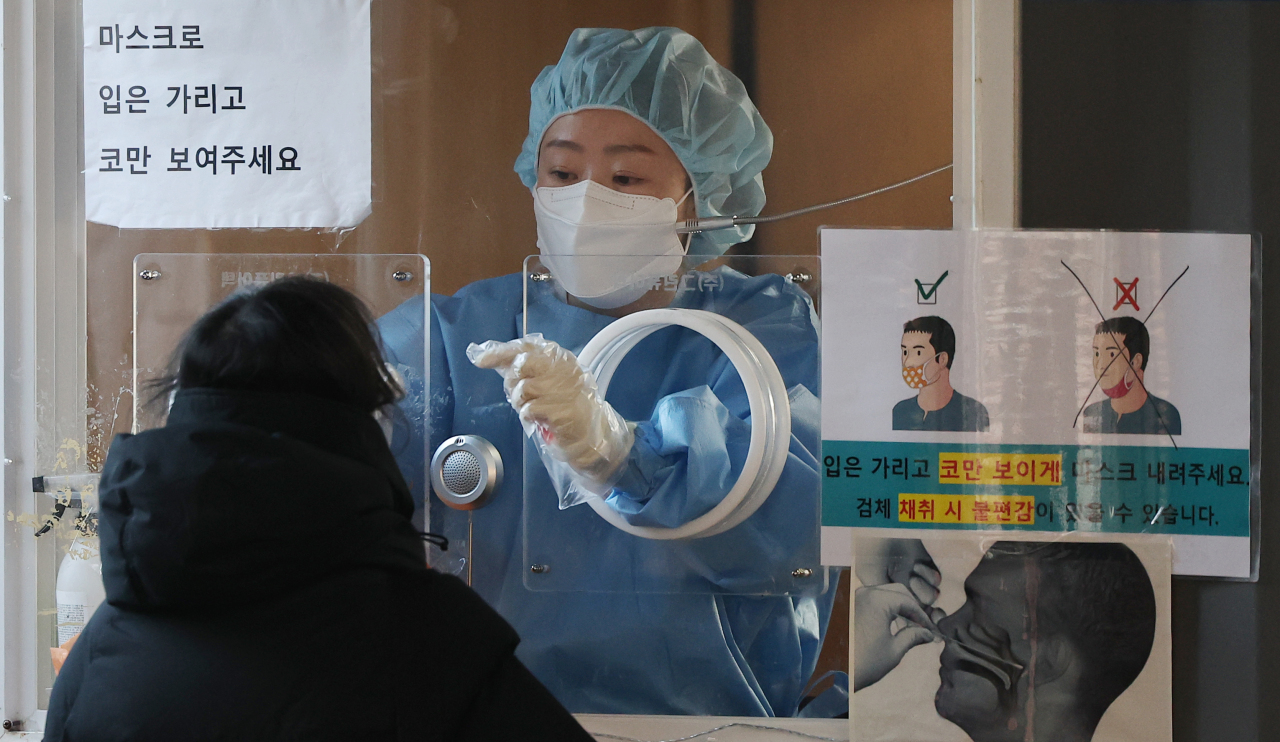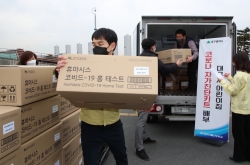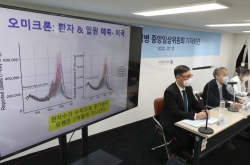When the inevitable omicron explosion descends on South Korea, the kind of restrictive approach to dealing with the virus will have run its course, top officials say.
In a news briefing Friday, the Health and Economy ministries said Korea will focus on keeping its businesses and other aspects of daily life as open as possible once the new variant starts dominating the scene.
The characteristics of omicron called for “a shift in a paradigm toward a more flexible response,” said Health Minister Kwon Deok-cheol.
“When omicron becomes dominant, cases are almost certain to rise significantly, in which case Korea will start pursuing a targeted protection of people at higher risk rather than control of the entire community, as it has been so far,” he said.
The threshold for transition to the omicron-specific strategy is 7,000 cases occurring per day, the minister said. For the past week, Korea has been counting an average of around 3,700 daily cases.
When that point comes, the country will ease up on many pillars of its pandemic control.
PCR testing, previously open to anyone wishing to get tested, will be offered primarily to older adults ages 65 and up, close contact of confirmed patients and people who have tested positive in rapid antigen tests. People with COVID-19-like symptoms will need a doctor’s recommendation to get tested.
For the rest, rapid antigen tests or the at-home kits will be the default testing method.
Contact tracing, conducted for close contacts of patients, will operate on an honor system basis. People who are younger than 60 and without existing health conditions can report their itineraries on a smartphone application.
Clinics will be set up to permit home recovery patients access to in-person care without having them take up bed spaces.
The isolation period for patients will be cut from the current 10 days to seven. Close contacts of patients will be tested on sixth day of quarantine to be released on seventh day depending on test results.
Travel bans on 11 countries -- Botswana, Eswatini, Ghana, Lesotho, Malawi, Mozambique, Namibia, Nigeria, South Africa, Zambia and Zimbabwe -- will end. The mandatory quarantine of 10 days for all arrivals may be adjusted, although the negative PCR testing requirement is likely to remain in place.
This contrasts with lockdown or similarly restrictive steps that other countries like Australia and the Netherlands have taken to counter omicron.
In a release to reporters on the same day the Health Ministry said, “When omicron drives cases up exponentially, the existing ways of responding to the virus may no longer be viable.”
Namely the 3T -- rigorous testing, contact tracing and extensive treating -- will hit a limit, forcing compromises, the ministry said.
The goal of the new strategy befitting omicron is “to provide a focused protection of vulnerable populations and respond to the pandemic in a sustainable manner,” the ministry said, explaining that the present rules were designed for combatting the more severe delta variant.
The ministry says the country’s hospitals are well-prepared to withstand a forthcoming surge.
Over the last two and a half months since Nov. 1, when the “living with COVID-19” scheme kicked off, more than 8,000 beds have been added through a series of executive orders on hospitals, it said. A wider home recovery program was also expected to reduce the strains.
As the country relaxes its grip on restrictions, its stock of vaccine and treatment will be beefed up, Kwon said.
Oral antivirals as well as omicron-targeting vaccines -- if they should come along -- will be brought in without delays, he said. Decisions are soon to be made on clearing vaccines for kids ages 5 to 11.
While a softened stance is being taken against omicron, more promises came for getting back to normal life.
On extending the 9 to 10 p.m. curfew on some businesses for the next three weeks, Kwon said that was intended to cushion the possible blow from the upcoming Seollal holiday.
“Don’t visit your parents if they haven’t been boosted yet,” he said.
“If we can navigate through the holiday season safely then I believe that we will be able to resume our journey toward normal life.”
Hong Nam-ki, who sits as Minister of Economy and Finance and ex-officio Deputy Prime Minister, said the administration was “doing everything in its powers to bring normal life back to Koreans as promptly as possible.”
By Kim Arin (
arin@heraldcorp.com)

![[From the scene] Solution to bed crisis? Korea sets up clinics for self-isolating patients](http://res.heraldm.com/phpwas/restmb_idxmake.php?idx=605&simg=/content/image/2022/01/13/20220113000889_0.jpg)









![[Today’s K-pop] Blackpink’s Jennie, Lisa invited to Coachella as solo acts](http://res.heraldm.com/phpwas/restmb_idxmake.php?idx=644&simg=/content/image/2024/11/21/20241121050099_0.jpg)